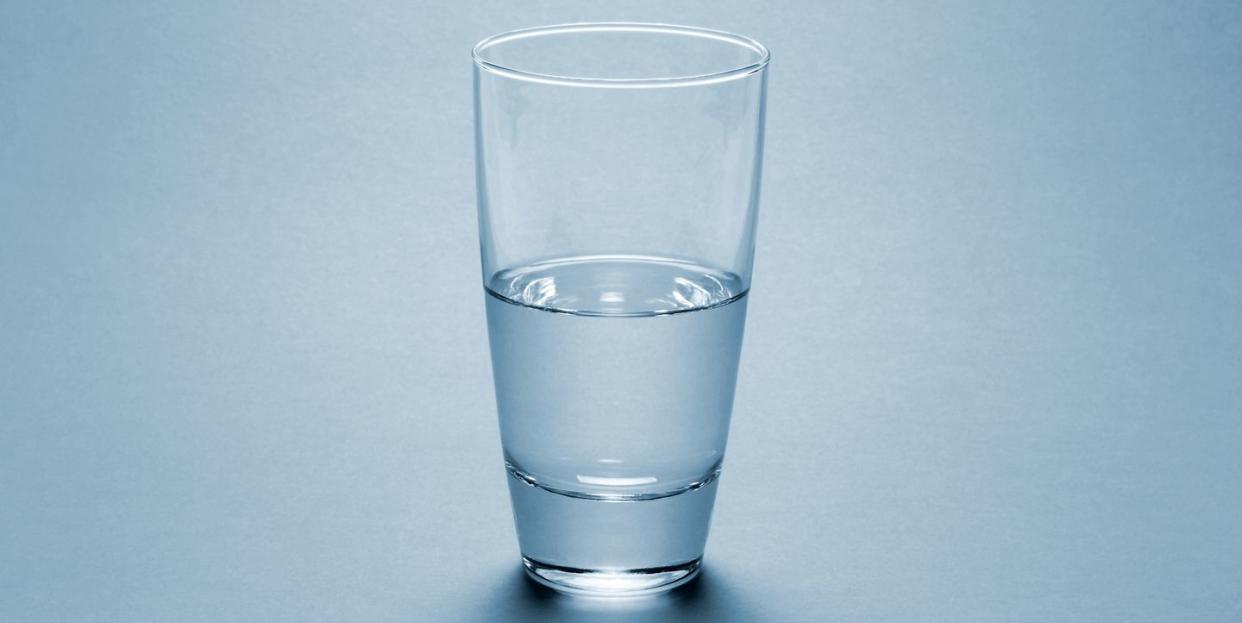How to Tell If You’re Suffering From Dehydration Headaches

When headaches strike, you want to do what you can to get relief fast. And, if there’s a quick and easy solution for your pain, even better. Turns out, doing something as simple as drinking enough water can help get rid of headaches—at least, it can when you’re dealing with dehydration headaches.
While it’s not a medical term, dehydration headaches are common and doctors say they regularly see patients who experience them. But what is a dehydration headache and how can you know if you’re experiencing one? Here’s the deal.
What is a dehydration headache?
A dehydration headache is a headache that happens when you don’t take in enough fluids, says Medhat Mikhael, M.D., a pain management specialist and medical director of the non-operative program at the Spine Health Center at MemorialCare Orange Coast Medical Center in Fountain Valley, Calif. And, unfortunately, even being mildly dehydrated can lead to head pain.
“When you are dehydrated, the brain tends to contract or shrink inside the skull,” Dr. Mikhael explains. “This puts a lot of pressure on the cranial nerves and some tension on the meninges, which is the lining covering the brain—it has a lot of nerves. This can lead to headache.”
There’s not a certain level of dehydration that will cause a headache, says Amit Sachdev, M.D., M.S., medical director in the Department of Neurology at Michigan State University—everyone is different. “We don’t have a specific line between dehydration and headache other than dehydration makes the entire body less resilient,” he says.
How common are dehydration headaches?
They’re very common, says Nicole Avena, Ph.D., a nutrition expert and assistant professor of neuroscience at the Mount Sinai School of Medicine. “It’s one of the first symptoms one can experience when dehydrated, outside of dry mouth and thirst,” she says.
Dr. Mikhael says he sees dehydration headaches a lot in his patients. “We notice that a lot of patients, when we ask how much fluids they drink and when was the last time that they had water—we can link the history of symptoms with times when they’re dehydrated or after strenuous exercise when they’ve sweated a lot,” he says.
What does a dehydration headache feel like?
Everyone is different. “Most commonly, dehydration leads to tension-type headaches with aching and low level pain,” Dr. Sachdev says. “Sometimes, it can trigger a more severe headache, such as a migraine.”
These headaches are usually “a full head ache, meaning it isn’t just one area that hurts,” Avena says. “It is also usually a dull, continuing ache that can last hours,” she adds.
What causes dehydration?
On a basic level, dehydration is caused by not taking in enough fluids or losing more fluids than you take in, Dr. Mikhael says.
According to the U.S. National Library of Medicine, these are some of the most common causes of dehydration:
Diarrhea
Vomiting
Sweating too much
Urinating too much
Fever
Not drinking enough
How to prevent dehydration headaches
It sounds silly, but experts say doing your best to ensure you’re taking in enough fluids is important. “It really is as simple as getting your liquids in,” Dr. Sachdev says.
Everyone’s hydration needs are different, but the U.S. National Academies of Sciences, Engineering, and Medicine generally recommends striving to reach the following goals (for liquids you get from both food and drink):
About 15.5 cups (3.7 liters) of fluids a day for men
About 11.5 cups (2.7 liters) of fluids a day for women
But certain medications you may be on, like water pills, could also influence your hydration needs. Dr. Mikhael says he had a patient who struggled with headaches after going on water pills for high blood pressure. “I told her that you can be behind in fluids because you’re peeing more than usual and are probably not compensating—you need to drink more water,” he says. “In her next visit she said, You were right. The headache is gone.”
If you find that you tend to struggle with dehydration headaches after you exercise, Dr. Mikhael recommends trying to be mindful of how much you’re drinking during and after your workouts. Electrolyte drinks and even pickle juice can help, Avena says. “They provide electrolytes without the sugar, and can help prevent dehydration headaches before they start,” she says.
How to treat dehydration headaches
Again, drinking more water should help. But, if your headache is especially bad, you're fine to take acetaminophen (Tylenol), says Kiran Rajneesh, M.D., a neurologist and pain specialist at The Ohio State University Wexner Medical Center.
“Just try to avoid any sugary drinks because they pull water from your tissues and can make you more dehydrated,” Dr. Rajneesh says.
When to see a doctor for headaches
If you find you’re getting regular headaches with symptoms that match those of a dehydration headache, doctors recommend drinking more water and seeing where that gets you. But if it doesn’t help, it’s time to see a doctor.
That’s especially true “if your headaches interfere with day to day activities, or are present more than once per week,” Dr. Sachdev says. And, if you experience more severe symptoms like fainting, numbness, tingling in your face, hand weakness, or numbness, it’s important to seek care immediately, Dr. Mikhael says. “Those are signs of a more serious condition like stroke,” he says.
You Might Also Like

